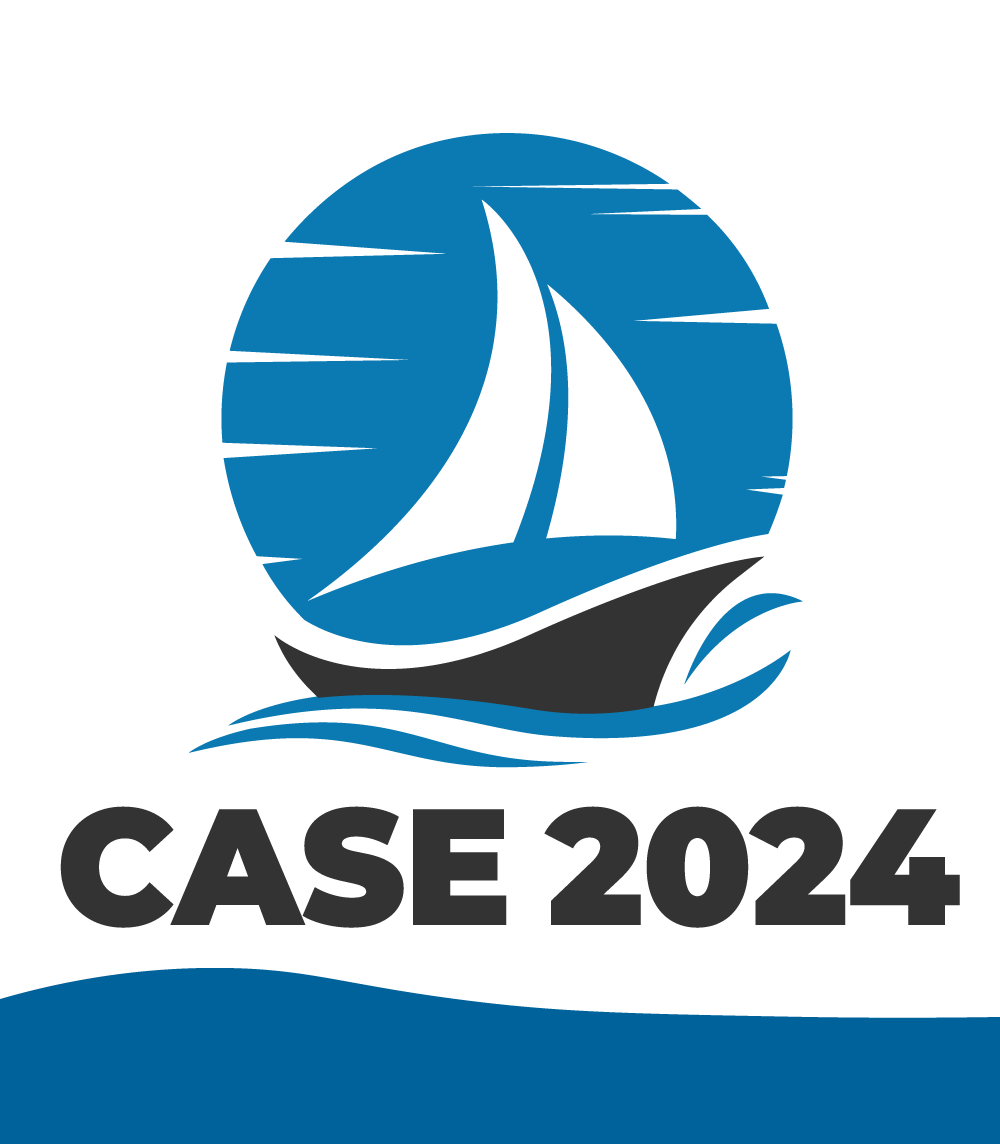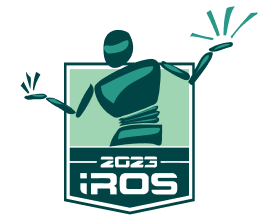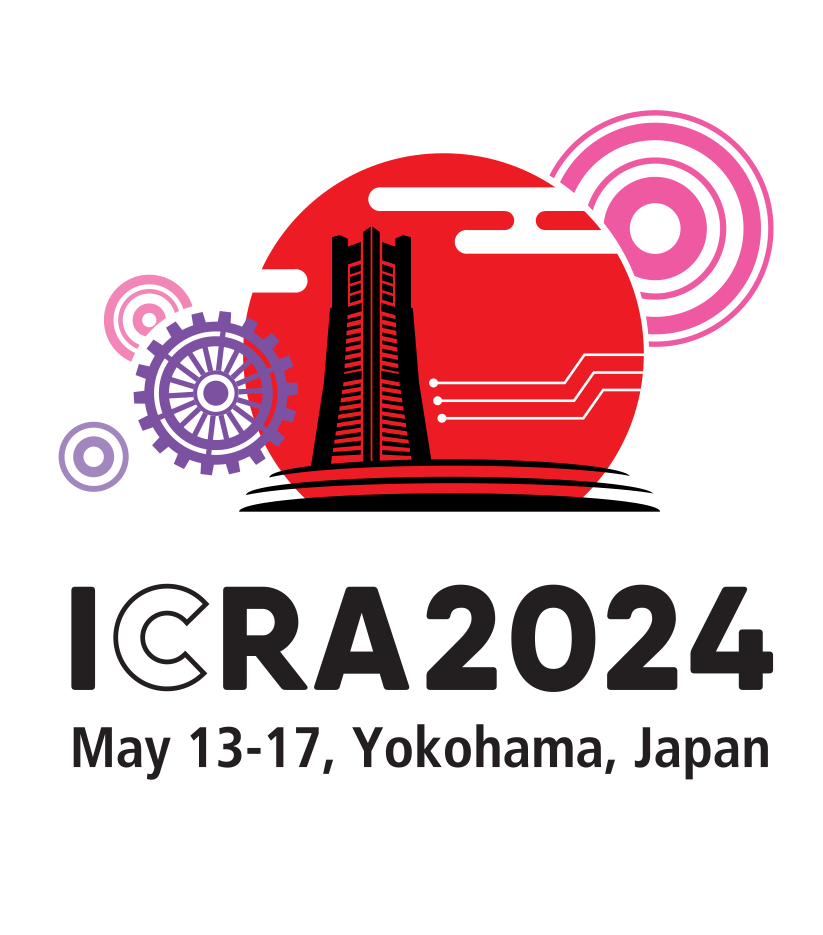Latest News
For dedication to IEEE, Fumio Harashima was awarded the 2015 Haraden Pratt Award "for outstanding leadership in globalization and diversity of IEEE communities."

Fumio Harashima spent more than three decades pushing the boundaries of power electronics and mechatronics in his lab at the University of Tokyo. At the same time, he was volunteering for IEEE and recruiting thousands of new members in Japan and throughout Region 10, the Asia Pacific region.
Harashima was the first member outside the United States to become president of the IEEE Industrial Electronics Society, a post he held in 1986 and 1987. He was IEEE secretary in 1990, and through the early part of that decade he was on several IEEE boards. At the same time, membership in IEEE Region 10 increased by some 10,000 members and participation in the local Industrial Electronics Society chapter skyrocketed. Harashima also has helped establish new IEEE societies, conferences, and journals.
Machines are everywhere. They run our factory assembly lines and make our coffee. But Robots—machines with human-like capabilities—have long been the stuff of science fiction. Fueled by an ambitious DARPA challenge, the race is on to design a robot that can replace humans in disaster relief situations. Follow the robots—and the engineers that program them—as they strive to make their way out of the lab and into the real world. But how capable are they, really? How close are we to a future where humanoid robots are part of our everyday lives? And what are the implications of a future with robots that can do a human's job? NOVA investigates the cutting-edge technologies that are advancing robotics as never before ... and the enormous challenges that the robots still face.
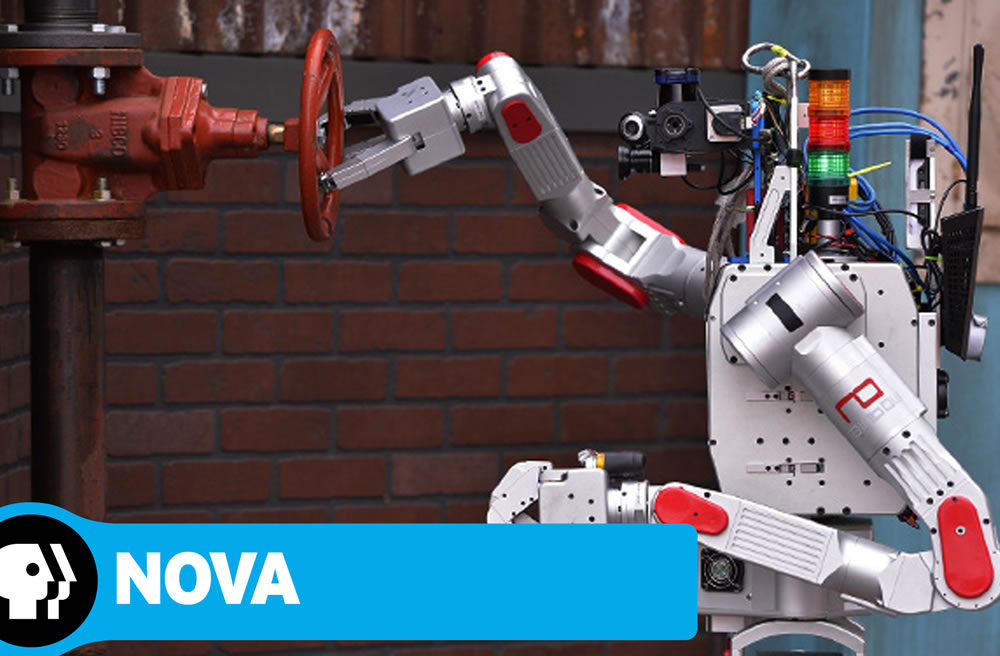
NOVA "Rise of the Robots" premieres Wednesday, 24 February 2016 at 9pm ET/8C on PBS.
View the YouTube video trailer here: https://www.youtube.com/watch?v=5CNKGNfTCL4
Beginning this year, authors will have a unique opportunity to publish a paper in a peer-reviewed journal: IEEE Robotics and Automation Letters (RA-L), and present the same paper at the RAS flagship conference on Automation: IEEE Conference on Automation Science and Engineering (CASE) to be held 21-24 August 2016 in Fort Worth, Texas, USA.
While submission to RA-L is open throughout the year, there is now a submission window when authors have an option for their paper to be considered for both RA-L publication and presentation at CASE. The submission window for CASE 2016 will be 1 February to 1 March. Submission for CASE-only papers is 6 March.
The final program of CASE will feature presentations to be archived in IEEE Xplore — in either RA-L or the CASE Conference Proceedings.
For more information on the new RAS journal IEEE Robotics & Automation Letters see: http://www.ieee-ras.org/publications/ra-l
IEEE Fellow is a distinction reserved for select IEEE members. The honor is conferred by the Board of Directors upon a person with an extraordinary record of accomplishments in any of the IEEE fields of interest.
If you know of an IEEE colleague who is a Senior Member or Life Senior Member in good standing, has completed five years of service in any grade of IEEE Membership and who has made an outstanding contribution to the electronic or electrical engineering profession, you can nominate this person in one of four categories:
Application Engineer/Practitioner, Educator, Research Engineer/Scientist or Technical Leader.

Nominations for the Fellow Class of 2017 are now being accepted. To learn more about the Fellow program and the nomination process, visit the About the IEEE Fellow Program page.
NOMINATION DEADLINE: 1 March 2016.
Additional information about the IEEE Fellow program, and a list of RAS Fellows is available HERE.
The IEEE Robotics & Automation Society recognizes and congratulates the following individuals for their outstanding accomplishments and service to RAS and the robotics and automation community. They will be honored during an award luncheon to be held at the IEEE International Conference on Robotics & Automation (ICRA 2016) on 19 May at the Stockholm Waterfront Congress Center, Stockholm, Sweden. Please join us in congratulating these outstanding recipients!
RAS Pioneer Award
Daniel Koditschek - University of Pennsylvania (PA), United States
"For his seminal contributions to the mathematical and empirical foundations of robotics, leadership in robotics research, inspired mentorship of the next generation of roboticists"
RAS George Saridis Leadership Award in Robotics and Automation
Ken Goldberg - University of California-Berkeley (CA), United States
"For his exceptional leadership, innovations and contributions to advancing automation science and engineering, particularly public outreach and archival publications"
Nikos Papanikolopoulos - University of Minnesota (MN), United States
"For his leadership, innovation, and dedication in RAS conference activities"
IEEE RAS Distinguished Service Award
Raj Madhavan - HumRobTech, LLC (MD), United States
"For his distinguished service and contributions to RAS industrial and humanitarian activities"
Jing Xiao - University of North Carolina at Charlotte (NC), United States
"For her leadership in RAS member activities, and distinguished service in support of RAS conferences and committees"
RAS Early Career Award (Academic)
Dmitry Berenson - Worcester Polytechnic Institute (MA), United States
"For contributions to the theory and implementation of robot motion planning and manipulation"
Ludovic Righetti - Max-Planck Institute for Intelligent Systems, Germany
"For contributions to the theory of, and experiments in, robot locomotion and manipulation"
RAS Early Career Award (Industry/Government)
Ioan A. Sucan - Google[x], (CA), United States
"For contributions to open source software for robot motion planning"
IEEE Inaba Technical Award for Innovation Leading to Production
Jean-Paul Laumond - Laas-Cnrs, France
"For outstanding contributions to motion planning commercialization in the robotics and automation industry"
IEEE Robotics and Automation Award for Product Innovation
Grabit Inc.
"In recognition of the Grabit Panel-Series Grippers that provide innovative and effective fabric handling based on electroadhesion"
RAS Most Active Technical Committee Award
Technical Committee on Aerial Robotics and Unmanned Aerial Vehicles
Chairs: Anibal Ollero, YangQuan Chen, Kimon P. Valavanis
RAS Chapter of the Year Award - Two Recipients this Year!
IEEE Eastern North Carolina, USA RAS Chapter
Chairs: Rodney Radford, Grayson Randall
IEEE RAS Monterrey, Mexico Chapter
Chair: Marco Ivan Ramirez Sosa Moran
Announcement
The purpose of this award is to highlight and honor the achievements of the inventors with value creating ideas and entrepreneurs who propel those ideas into world-class products. This is a key element to the continuing success of robotics and automation today. Active infusion of innovation and entrepreneurship into technological advancement is regarded critical at this juncture to strengthen a healthy balance between research and practice as well as a healthy growth of industrial and commercial sectors in robotics and automation.

In a joint event the IEEE Robotics and Automation Society and the International Federation of Robotics will therefore recognize and honor outstanding achievements of entrepreneurs in the commercialization of innovative robotic and automation technology. These achievements will be recognized in a specially organized IEEE/IFR Joint Forum on Innovation and Entrepreneurship in Robotics and Automation, which is being held on 21 June 2016 in conjunction with the International Symposium on Robotics (ISR) in Munich, Germany. The selected finalists will have the opportunity to present their story of the genesis of a successful innovative product in robotics and automation from its very inception to the final state of commercialization in a series of plenary lectures. An evaluation board consisting of distinguished individuals from industry and academia will choose the winner. A prestigious plaque and a US$ 2,000 prize will be awarded to the winner.
Applications should describe the original work that has been translated into a commercial success. The application must include statements regarding:
- description of the innovation/product/application
- stages of the product genesis
- novelty/uniqueness of the product
- market analysis, economic viability and pathway for commercialization
- sustained competitive advantage
- current and future impact on and relevance to industry
DON'T MISS THE DEADLINE!
Applications for the IERA Award must be submitted no later than 15 March 2016.
Call for Applications
Applications should not exceed a maximum length of 5 pages. Product descriptions and public relation material will not be accepted as an application. References and links to online material are permitted.
Submission of Applications
Please send as PDF document (< 6 MB) no later than 15 March 2016 (any time zone) to IFR Secretariat – secretariat@ifr.org
posted 28 January 2016
The sixth IEEE RAS/EMBS International Conference on Biomedical Robotics and Biomechatronics - BioRob 2016 - is a joint effort of the two IEEE Societies of Robotics and Automation (RAS) - and Engineering in Medicine and Biology (EMBS). BioRob covers both theoretical and experimental challenges posed by the application of robotics and mechatronics in medicine and biology. The primary focus of Biorobotics is to analyze biological systems from a "biomechatronic" point of view, trying to understand the scientific and engineering principles underlying their extraordinary performance. This profound understanding of how biological systems work, behave and interact can be used for two main objectives: to guide the design and fabrication of novel, high performance bio-inspired machines and systems for many different applications; and to develop novel nano, micro-, macro- devices that can act upon, substitute parts of, and assist human beings in prevention, diagnosis, surgery, prosthetics, rehabilitation and personal assistance.
The 2016 Edition will be held 26-29 June 2016 in Singapore.
New Final Extension:
To address many requests we have received for an extension due to busy schedules, we are delighted to be able to extend the final deadline one last time by more than one month to 1 March 2016 for student competition papers and 4 March 2016 for regular papers. Please note that after this date we will not be able to accommodate any further extensions.
Late Breaking Announcement:
STUDENT PAPER AND POSTER COMPETITION
IEEE BioRob 2016 announces an exciting student paper and poster competition. There will be 3 major awards and 7 consolation prizes awarded to 7 students and post-doctoral fellows. The awardees will receive cash prizes, financial support for participating in the conference, as well as academic recognition to be publicized through the sponsoring IEEE EMBS and RAS societies.
Deadline for submission of student papers has been extended to 1 March 2016. Submitted papers will be judged and finalists announced before the conference, and awards will be given out at the Conference.
For more information see: http://www.ieeebiorob2016.org/
posted 19 Janaury 2016
Don't delay! Nominations are due 31 January 2016 for the 2017 IEEE Technical Field Award in Robotics and Automation. This is the most prestigious award presented by the IEEE in the field of robotics and automation and includes a medal and a $US 10,000 honorarium. IEEE TFAs are awarded for contributions or leadership in a specific field of interest of the IEEE and are among the highest awards presented on behalf of the IEEE Board of Directors.
Visit http://www.ieee-ras.org/awards-recognition/ for a description of the award criteria and instructions on submitting a nomination.
The 2016 IEEE Technical Field Award in Robotics and Automation will be presented to Raffaello D'Andrea "For pioneering contributions to design and implementation of distributed, cooperative robotics and automation systems for commercial applications." The presentation will take place at the Award Ceremony held during ICRA 2016 in Stockholm, Sweden from 16-21 May 2016.
posted 11 January 2016
As 2015 is drawing to a close, we would like to wish all of our Members and Friends best wishes for the Holiday Season, and for a happy, healthy and prosperous 2016!
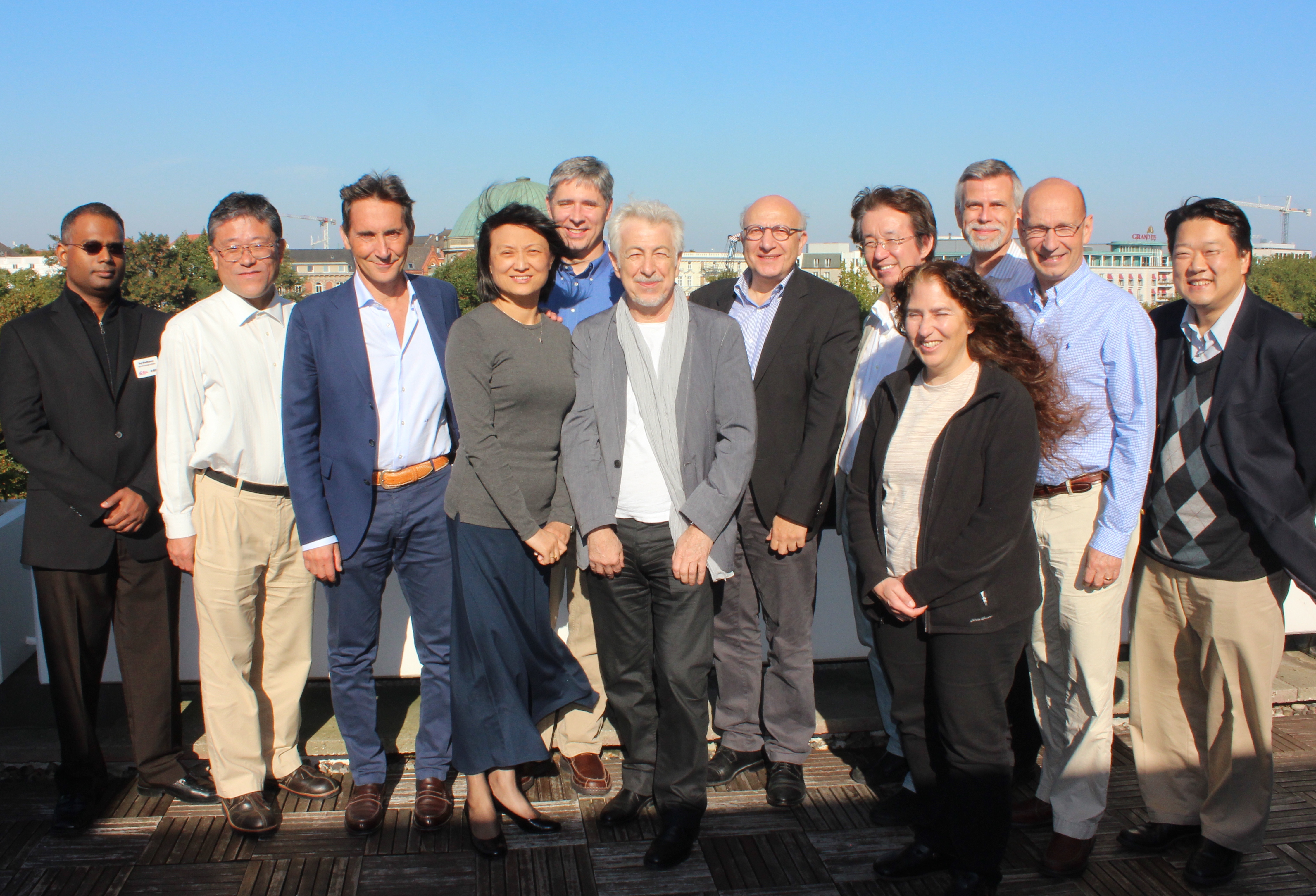
A huge special thanks must be given to the following RAS Officers serving on the 2015 Executive Committee (ExCom). They have worked tirelessly to provide additional benefits and services to RAS members and the industry:
l-r: Raj Madhavan, Satoshi Tadokoro, Antonio Bicchi, Jing Xiao, Kevin Lynch, Oussama Khatib, Raja Chatila, Fumihito Arai, Nancy Amato, Tony Maciejewski, Ron Lumia, Paul Oh
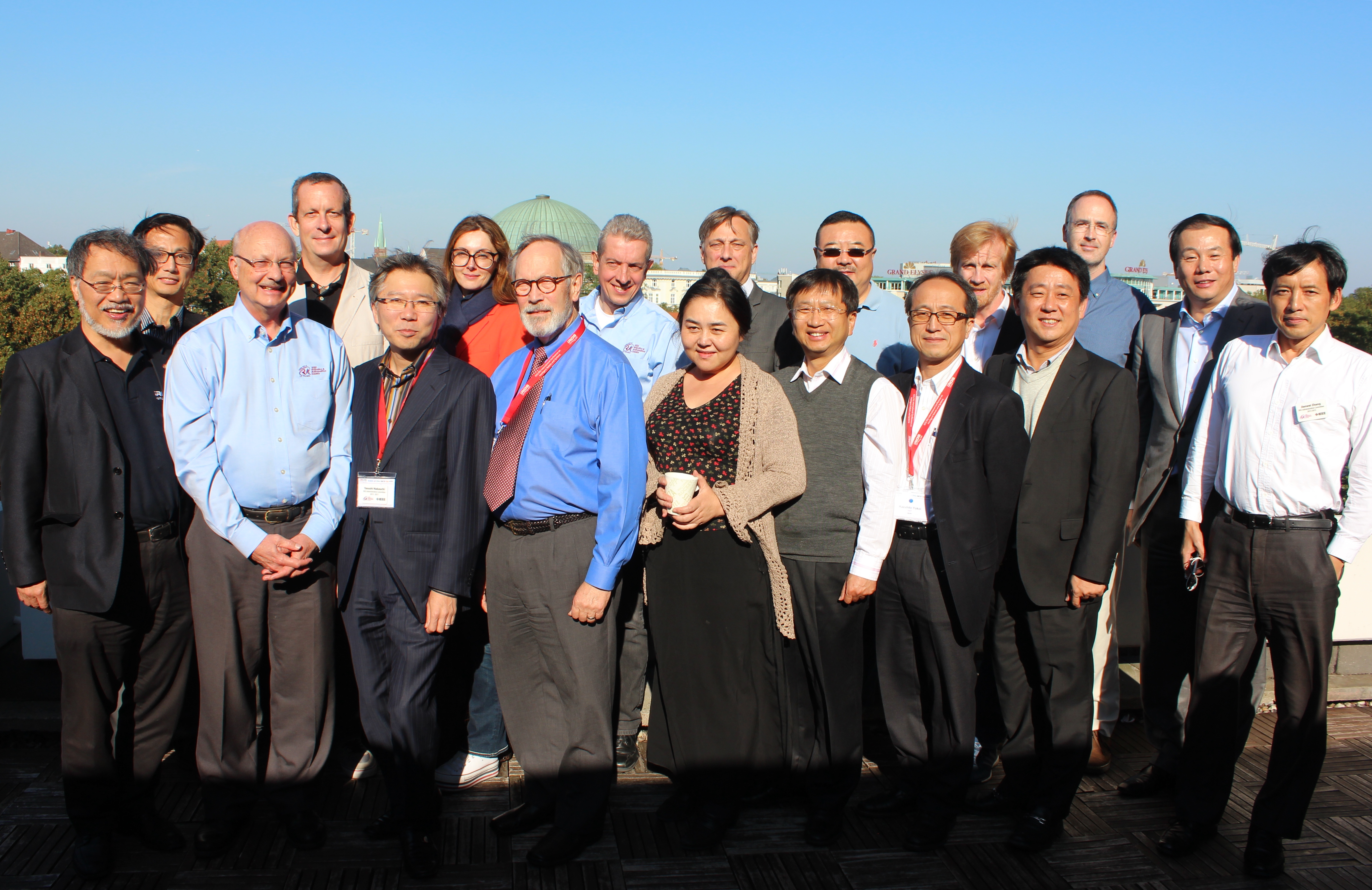
And we must also heartily thank those serving on the 2015 RAS Administrative Committee (AdCom). Without their dedication and commitment, RAS would not be one of the leading IEEE Societies!
l-r: Toshio Fukuda, Hong Zhang, David Orin, Martin Buss, Yashushi Nakauchi, Danika Krajic, Bill Hamel, Wolfram Burgard, Hong Qiao, Seth Hutchinson, Dong-Soo Kwon, Max Meng, Kazuhito Yokoi, Brad Nelson, Zhi Dong Wang, Richard Vaughan, Ning Xi, Jianwei Zhang
not pictured: Lauren Miller, Lydia Kavraki
posted 30 December 2015
CALL FOR PAPERS
IEEE Robotics and Automation Magazine
The open-source movement has already revolutionized a number of industries by empowering end-users to contribute to the products that they need and want, and fueling grass-roots development of projects in completely new areas, as well as their continual improvement. While there have been innumerable successes in software and electronics hardware, open mechanical hardware is taking longer to catch on, in large part due to the complexity and expense associated with fabricating mechanical systems. However, rapid fabrication technologies have improved to the point of being able to produce parts that are strong, robust, and precise enough for practical robotic systems and the many of these machines are available in fabrication facilities at most universities. With these and other technologies, users can more easily fabricate and improve upon open-source mechanical hardware without requiring large commitments in terms of cost, time, and domain expertise. This special issue seeks a collection of papers that address topics in open mechanical robot hardware, including issues related to design, fabrication, and dissemination, among others. Lessons learned in both development and in operation are pertinent to the discussion. Experimental results are strongly encouraged.
Topics of interest include but are not limited to:
- Novel open hardware for research, education, or commercial applications that has been specifically developed for easy and widespread fabrication, assembly, customization, and/or repair
- Projects that combine substantial mechanical hardware with open software/electronics hardware
- Research results that strongly rely on open mechanical hardware, such as performance results
- Novel fabrication techniques that facilitate open hardware fabrication and dissemination
Additionally, it is suggested that papers include, in addition to technical content, discussion of challenges and lessons learned as a result of their efforts in open-source or widely-disseminated research hardware such that researchers can learn from them for future efforts.
Topics that do not speak to issues specific to open-source mechanical hardware are out of scope, including:
- Projects that are entirely or largely based on open-source software or electronics hardware
- Mechanical hardware that is not open, such as commercial hardware
- Traditional mechanical hardware that has not been designed specifically for easy implementation (e.g. requiring extensive machining) is likely to be out of scope (even if the designs have been made publically available), unless there is strong evidence of wide-spread adoption/implementation and provides insight for other open-source hardware efforts.
Authors of prospective papers are encouraged to send an abstract or description of the work to the special issue editors to discuss its relevance to the SI scope.
IMPORTANT DATES
1 April 2016 - Submission deadline
15 July 2016 - End of first review round and author notification
15 November 2016 - Final decisions made
1 December 2016 - Final manuscripts due
March 2017 - Issue in print
Guest Editors
Aaron Dollar - Yale University, aaron.dollar@yale.edu
Giorgio Metta - Italian Institute of Technology, Giorgio.Metta@iit.it
Francesco Mondada - EPFL, francesco.mondada@epfl.ch
Alberto Rodriquez - CMU, albertor@cmu.edu
Complete details at http://www.ieee-ras.org/publications/ram/ram-special-issues/special-issue-on-open-source-and-widely-disseminated-robot-hardware
posted 21 December 2015
Ning Xi will serve as RAS President Elect 2016-2017. During the 3 October meeting in Hamburg, Germany, the RAS Administrative Committee elected Xi to serve as President Elect under the incoming president, Satoshi Tadokoro and to assume the Society presidency in January 2018. He is an IEEE Fellow and has served RAS on the Administrative Committee, and as past Chair of ICRA 2014, IROS 2009 and AIM 2005.
Ning Xi received his D.Sc. degree in Systems Science and Mathematics from Washington University in St. Louis, Missouri, USA in 1993. Currently, he is a University Distinguished Professor, the John D. Ryder Professor of Electrical and Computer Engineering and Director of Robotics and Automation Laboratory at Michigan State University, East Lansing, Michigan, USA. He is a Fellow of IEEE. Dr. Xi's extensive experience in research and teaching comprise robotics and automation, in particular in the areas of control and planning for robotic systems, nano robots and manipulations, telerobotics, and manufacturing automation. Dr. Xi is a recipient of the Best Paper Award in IEEE/RSJ International Conference on Intelligent Robots and Systems (IROS) and the Best Transactions Paper Award from IEEE Transactions on Automation Science and Engineering. Dr. Xi was the first to receive the Early Academic Career Award by the IEEE Robotics and Automation Society in 1999.
posted 16 December 2015
Congratulations to the following RAS Members - elevated to Fellow grade, effective 1 January 2016!
2016 RAS Fellows evaluated by the IEEE Robotics & Automation Society:
Alin Albu-Schaeffer
German Aerospace Center (DLR)
Technical University Munich, Germany
"for contributions to compliant and lightweight robots"
Tatsuo Arai
Osaka University, Japan
"for contributions to micro manipulators and sensors, and applications to cellular biology"
Chun-Hung Chen
George Mason University, (VA) USA
"for contributions to simulation-based optimization of automation systems"
Wan Kyun Chung
Pohang Univ. of Science & Technology, South Korea
"for developments in robust control theory for mechanical systems"
Qiang Huang
Beijing Institute of Technology, China
"for contributions to the design and control of biped robots"
Danica Kragic
Royal Institute of Technology, Sweden
"for contributions to vision-based systems and robotic object manipulation"
Domenico Prattichizzo
Universita di Siena, Italy
"for contributions to haptics and multi-fingered robotic hands"
Stergios Roumeliotis
University of Minnesota, (MN) USA
"for contributions to visual-inertial navigation and cooperative localization"
Il-Hong Suh
Hanyang University, South Korea
"for contributions to the design and control of redundant and multiple-arm robot systems"
2016 RAS Fellows evaluated by other IEEE Societies:
Evaluated by the IEEE Control Systems Society:
Michael Branicky
University of Kansas, (KS) USA
"for contributions to switched and hybrid control systems"
Evaluated by the IEEE Control Systems Society:
Warren Dixon
University of Florida, (FL) USA
"for contributions to adaptive control of uncertain nonlinear systems"
Evaluated by the IEEE Control Systems Society:
Wei Ren
University of California- Riverside, (CA) USA
"for contributions to distributed coordination and control of multi-agent systems"
Evaluated by the IEEE Engineering in Medicine & Biology Society:
Gabor Fichtinger
Queens University, (ON) Canada
"for contributions to medical robotics and computer-assisted intervention"
Evaluated by the IEEE Industrial Electronics Society:
Armando Colombo
Schneider Electric Automation GmbH, Germany
"for contributions to industrial cyber-physical systems"
Evaluated by the IEEE Systems, Man & Cybernetics Society:
Zhiwu Li
Xidian University, China
"for contributions to Petri nets and their applications to automated manufacturing systems"
Evaluated by the IEEE Signal Processing Society:
Dinei Florencio
Microsoft Research, (WA) USA
"for contributions to statistical and signal processing approaches to adversarial and security problems"
posted 10 December 2015
To reduce financial burden on authors and members, increase consistency, and to clarify distinctions between the two Transactions and the new RA-Letters, the page overlength policy will be revised as follows:
For IEEE Transactions on Automation Science & Engineering (T-ASE) and IEEE Transactions on Robotics (T-RO) papers submitted after 20 November 2015, there will be no overlength charges for the first 12 pages of Regular papers nor the first 6 pages of Short papers. Overlength charges will apply to any pages between 13-20 of Regular papers and to pages 7 or 8 of Short papers. T-ASE and T-RO Regular papers cannot exceed 20 pages and Short papers cannot exceed 8 pages.
The IEEE Robotics & Automation Letters (RA-L) overlength policy is the same as that for Short Transactions papers above.
For the IEEE Robotics & Automation Magazine (RAM), there are no overlength charges for the first 9 pages but page charges will apply to any pages between 10-16.
posted 1 December 2015
Deadline EXTENDED: 14 December 2015
The IEEE Robotics and Automation Society is seeking applications for the Member Activities Board's Student Activities Committee (SAC). There are three available positions; one Chair and two co-Chairs. These positions are a great opportunity to learn more about the Society, have an international impact, and expand one's professional network. The chair will serve for two calendar years (2016–17), and the co-chairs for one-year term in 2016 and renewable for a second year.
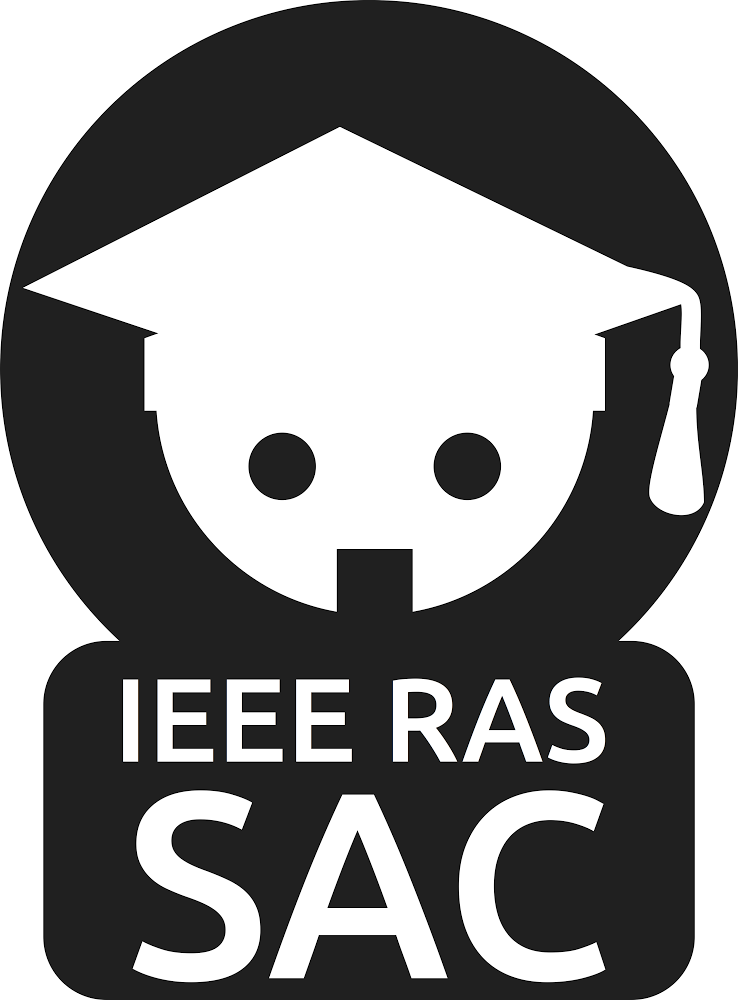 If you wish to be considered, please send the following information to ras@ieee.org before 15 November 2015.
If you wish to be considered, please send the following information to ras@ieee.org before 15 November 2015.
1. A letter indicating why you are interested in serving on the SAC board (2 pages maximum)
2. A copy of your CV or resume (2 pages maximum)
3. A letter of support from a faculty member at your college or university, who is a member of IEEE RAS.
For more information on the SAC and current activities, refer to the webpage or email Lauren Miller, 2014-2015 SAC Chair at lmiller@u.northwestern.edu.
updated 20 November 2015
The next challenge will be held at ICRA 2016, in Stockholm, Sweden, May 2016.
http://www.isr.uc.pt/HRATC2016
http://www.icra2016.org/conference/challenges/
DEADLINE:
Description Papers due 14 December 2015
According to the UN Mine Action Service, landmines kill 15,000-20,000 people every year (mostly children) and maim countless more across 78 countries. Demining efforts cost US$ 300-1000 per mine, and, for every 5000 mines cleared, one person is killed and two are injured. Thus, clearing post-combat regions of landmines has proven to be a difficult, risky, dangerous and expensive task with enormous social implications for civilians. Motivated by these considerations, the IEEE Robotics & Automation Society Special Interest Group on Humanitarian Technology (RAS SIGHT) is inviting the academic and non-academic community to participate in the third Humanitarian Robotics and Automation Technology Challenge (HRATC) at the 2016 International Conference on Robotics and Automation (ICRA 2016).
Following on the footsteps of the success of the HRATC Challenge that was held at ICRA 2014 in Hong Kong and ICRA 2015 in Seattle, this HRATC edition will continue to focus on promoting the development of new strategies for autonomous landmine detection using a mobile (ground) robot. The Challenge will take place in three phases: 1) Simulation Phase, 2) Testing Phase, and 3) Challenge Phase. The strategies developed by the participating teams will be objectively and quantitatively evaluated according to the following criteria: exploration time and environmental coverage; detection and classification quality; and landmine avoidance. Teams will be progressively eliminated after each phase and the remaining teams would move on to the next phase culminating in the Challenge (Finals) phase at ICRA 2016.
All teams will use the same robot, called FSR-Husky, that will be available before (for remote practice runs) and during the Challenge. Furthermore, participants will have access to a ROS-based simulator to develop and test their code before testing it remotely on the real robot.
How To Participate in the Challenge
All potential participants should submit a paper (1-2 pages) in the standard IEEE format including figures that describes the motivation and previous experiences/research (if any). The organizers will then evaluate this paper and an acceptance notification containing further steps would follow. All submissions should be sent to <hratc2016@gmail.com>. The Challenge will take place remotely in Coimbra, Portugal, and beamed in real time to the Stockholm Waterfront Congress Centre during ICRA 2016. Necessary logistics and travel support will be provided depending on the number of qualifying teams.
More details on HRATC 2014 and HRATC 2015 can be found at http://www.isr.uc.pt/HRATC2014/ and http://www.isr.uc.pt/HRATC2015/, respectively, and from following summary published in the IEEE-RAS Robotics and Automation Magazine (RAM):
2015 Humanitarian Robotics and Automation Technology Challenge by Madhavan, R.; Marques, L.; Prestes, E.; Maffei, R.; Jorge, V.; Gil, B.; Dogru, S.; Cabrita, G.; Neuland, R.; Dasgupta, P. IEEE-RAS Robotics and Automation Magazine, Sept. 2015.
About IEEE RAS-SIGHT
The IEEE RAS SIGHT is the first IEEE Society to have a SIGHT! The mission of RAS-SIGHT is the application of robotics and automation technologies for promoting humanitarian causes around the globe, and to leverage existing and emerging technologies for the benefit of humanity and towards increasing the quality of life in underserved, underdeveloped areas in collaboration with existing global communities and organizations. To engage the international community in these causes, RAS-SIGHT has been organizing Challenges and funding small projects centered on humanitarian causes.
See http://www.ieee-ras.org/educational-resources-outreach/humanitarian-efforts for more details.
Acknowledgments
The Challenge organizers thank the FP7-TIRAMISU project (http://www.fp7-tiramisu.eu/) and Clearpath Robotics, Inc. for their support and partnership in organizing HRATC 2016.
Congratulations to the six RAS members elected by the membership to serve a three-year term beginning 1 January 2016. We wish the newly elected members of the Administrative Committee success and thank all candidates for their willingness to serve and for permitting their names to be included on the ballot.
AdCom Members Elected at Large:

Gianluca Antonelli
University of Cassino and Southern Lazio, Italy

Peter Corke
Queensland University of Technology, Australia
AdCom Member from RAS Geographic Area 1 (the Americas):

Bill Hamel
University of Tennessee, (TN) USA
AdCom Members from RAS Geographical Area 2 (Europe, Africa, Middle East--IEEE Region 8):
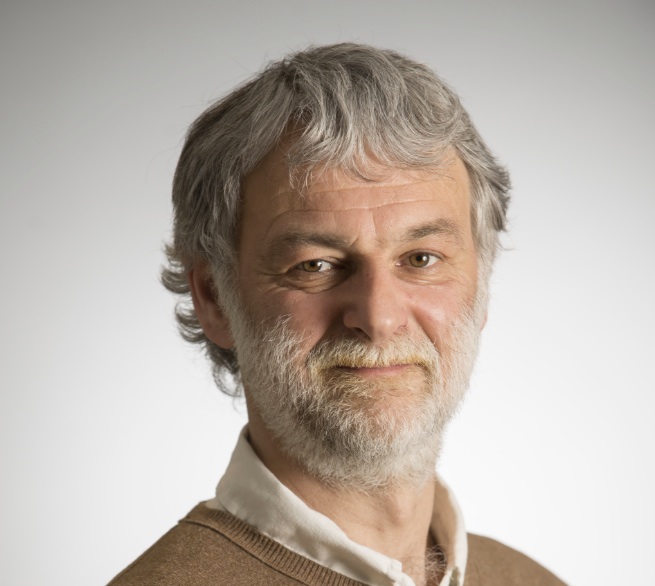
François Chaumette
Inria Rennes, France
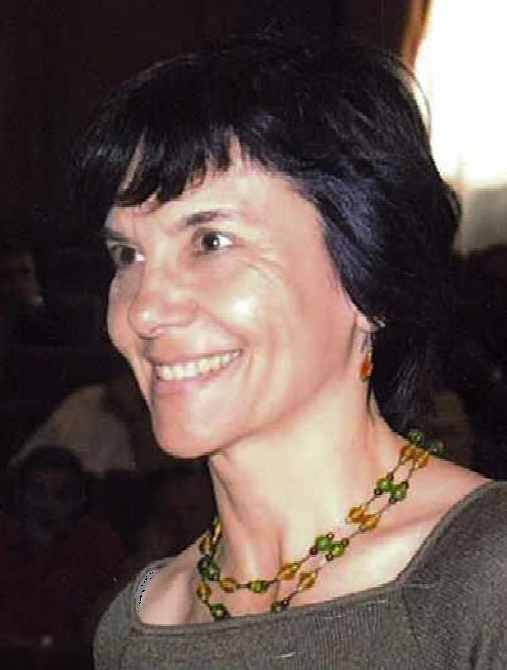
Carme Torras
Institut de Robòtica i Informàtica Industrial (CSIC-UPC) Barcelona, Spain
AdCom Member from RAS Geographical Area 3 (Asia, Australia, Pacific Rim):

Max Q.-H. Meng
Chinese University of Hong Kong, Hong Kong, China
posted 9 November 2015
Proposals due 10 December 2015!
Robotics & Automation (R&A) Technologies have the potential to transform and improve the lives of humanity by addressing the world's toughest challenges. The IEEE Robotics and Automation Society - Special Interest Group on Humanitarian Technology (RAS-SIGHT) is engaging the academic and non-academic community to propose viable solutions in R&A to address relevant world problems through several initiatives that include challenges in robotics conferences, funding projects, establishment of collaboration networks with academia, industry, and governments.
RAS is the first IEEE Society to have a SIGHT! The mission of RAS-SIGHT is the application of robotics and automation technologies for promoting humanitarian causes around the globe, and to leverage existing and emerging technologies for the benefit of humanity and towards increasing the quality of life in under-served, under-developed areas in collaboration with existing global communities and organizations. As an example of this initiative, RAS-SIGHT has organized two editions of the Humanitarian Robotics and Automation Technology Challenge at the 2014 and 2015 International Conference on Robotics and Automation (ICRA). For additional information, see articles in the IEEE Robotics and Automation Magazine:
http://ieeexplore.ieee.org/xpl/articleDetails.jsp?arnumber=7254314 &
http://ieeexplore.ieee.org/xpl/articleDetails.jsp?arnumber=6894711.
RAS-SIGHT envisions HRATCs as an unprecedented opportunity for technologists from around the world to collaborate using their skills and education to benefit humanity. The problems (challenges) are framed with the environmental, cultural, structural, political, socio-economic, and resource constraints so that solutions can be developed, deployed, and sustained.
In this vein, RAS-SIGHT is soliciting proposals that when implemented would improve the quality of life for the beneficiaries.
Some important points worth noting:
- The problem that you propose to solve should utilize robotics and automation technologies
- It is strongly encouraged that the solution be developed and deployed with active involvement from the community or the end-users that it is intended to benefit
- Sustainability beyond the completion of the project will be a key consideration
If you are interested, please submit a *4 page (max.) proposal* in the standard IEEE conference format (http://www.ieee.org/conferences_events/conferences/publishing/templates.html) outlining:
- the problem,
- the solution,
- related work, similar initiatives, and how the proposed project will achieve new results than what is currently available,
- proposed partnerships with existing initiatives,
- number of people who would be impacted,
- previous experiences, both in terms of research and deployment,
- project development timeline,
- a breakdown of anticipated costs, and how the funds would be used to support the project
- short biographies of project members (with URLs of your website)
We anticipate to fund 8-10 proposals in the US$2000-$2500 range.
*** Deadline: 10 December 2015 ***
*** Acceptance notification: 10 January 2016 ***
All submissions and questions should be sent to Raj Madhavan, Chair, RAS-SIGHT via email at <raj.madhavan@ieee.org>.
posted 5 November 2015
The 36th edition of the "Guido Dorso Award" was presented to Bruno Siciliano on 15 October 2015 in a ceremony held at the Senate of the Republic in Rome by the Rector of University of Naples Federico II. Every year, the Guido Dorso Award recognizes fellows who have contributed their work to support the needs of development and progress of Southern Italy. Siciliano received the award for the section "University". Distinguished fellows from the political, economic and cultural world received the award in the past years, including two Nobel prizes.
http://www.unina.it/-/10640377-bruno-siciliano-e-tra-i-vincitori-della-36a-edizione-del-premio-dorso
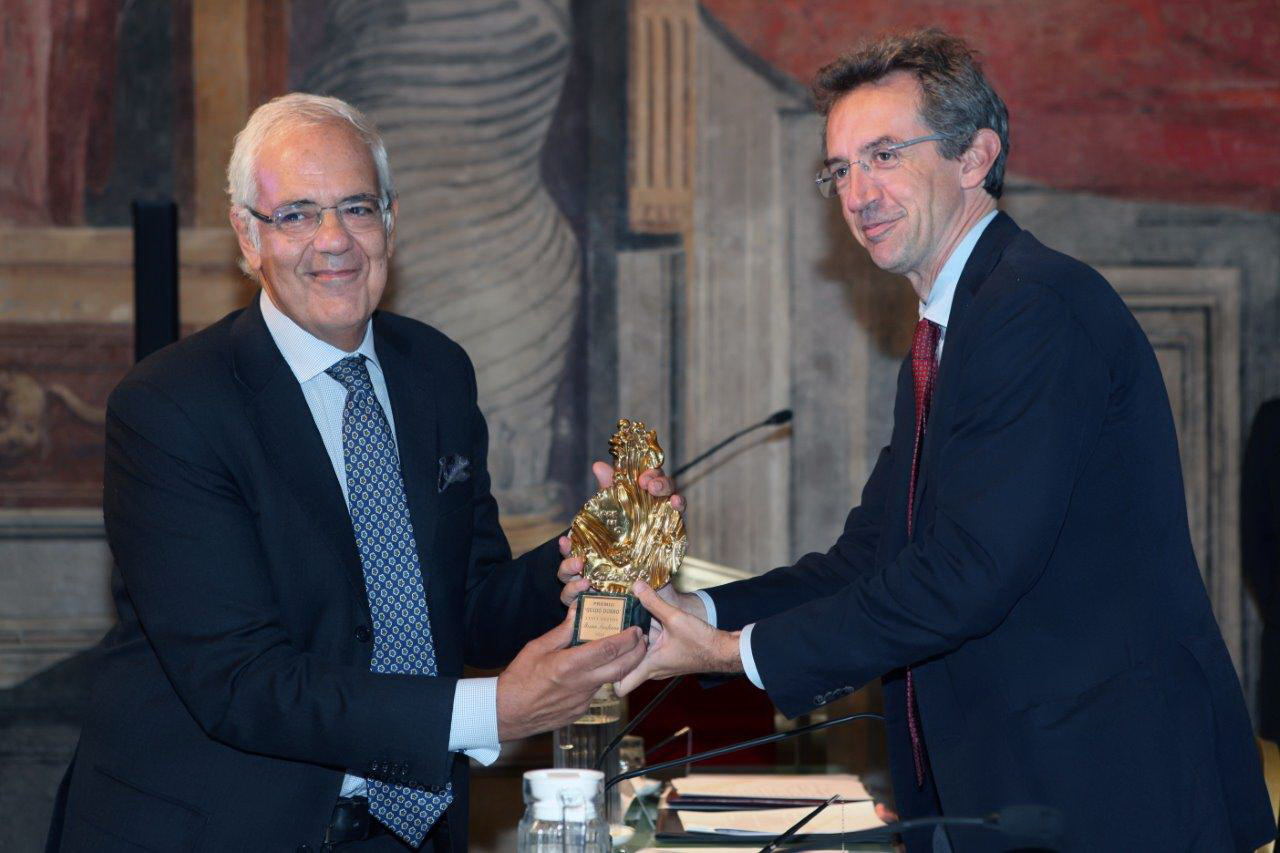
Fifty-six year old, professor of Control and Robotics at University of Naples Federico II and Coordinator of the Programme in Automation Engineering, Bruno Siciliano is the scientific director of PRISMA Lab, the Laboratory of Projects for Industrial and Service Robotics, Mechatronics and Automation in the Department of Electrical Engineering and Information Technology.
Professor Siciliano coordinates a staff of 25 researchers including junior faculty, fellows, graduate students and post-docs from four continents. His group has participated in 15 projects financed by the European Union for a total funding of 8.5 million euro in the last 8 years. He has held representative positions within professional societies, including President of the IEEE Robotics and Automation Society for 2008-2009. Professor Siciliano is the only European to be a Fellow of the three most important scientific associations in the sector of automation (IEEE, ASME and IFAC ) and has received numerous awards at national and international levels.
His research interests are in force control, visual control, bimanual manipulation, aerial robotics, coexistence between robots and humans, and service robotics. He has published 300 articles in journals and conference papers and 7 books on robotics; his book Robotics: Modelling, Planning and Control is one of the most adopted texts in the universities around the world and has been translated into Italian, Chinese and Greek. He is Co-Editor of the Springer Handbook of Robotics, which was awarded the highest award for scientific publishing: 2008 AAP PROSE Award for Excellence in Physical Sciences & Mathematics, and Award for Engineering & Technology. He has held 20 plenary lectures at international conferences and more than 100 invited seminars at foreign institutions, and has carried out an intense publishing activity.
Equally intense has been his activity to disseminate robotics and science to the general public. The results of his research have earned him numerous awards and hundreds of articles in national and foreign newspapers and magazines, as well as many appearances on radio and TV.
posted 3 November 2015
The IEEE/RSJ International Conference on Intelligent Robots and Systems (IROS2015) was held 28 September – 2 October 2015, in Hamburg, Germany. Congratulations to the following winners - announced on 1 October.
IROS Distinguished Service Award
To recognize individuals who have performed outstanding service for the benefit and advancement of IROS.
Toshio Fukuda - "For his outstanding services in founding and supporting IROS conferences"
Tzyh-Jong Tarn - "For his outstanding services to IROS Advisory/Steering Committee and IROS conferences"
IROS Toshio Fukuda Young Professional Award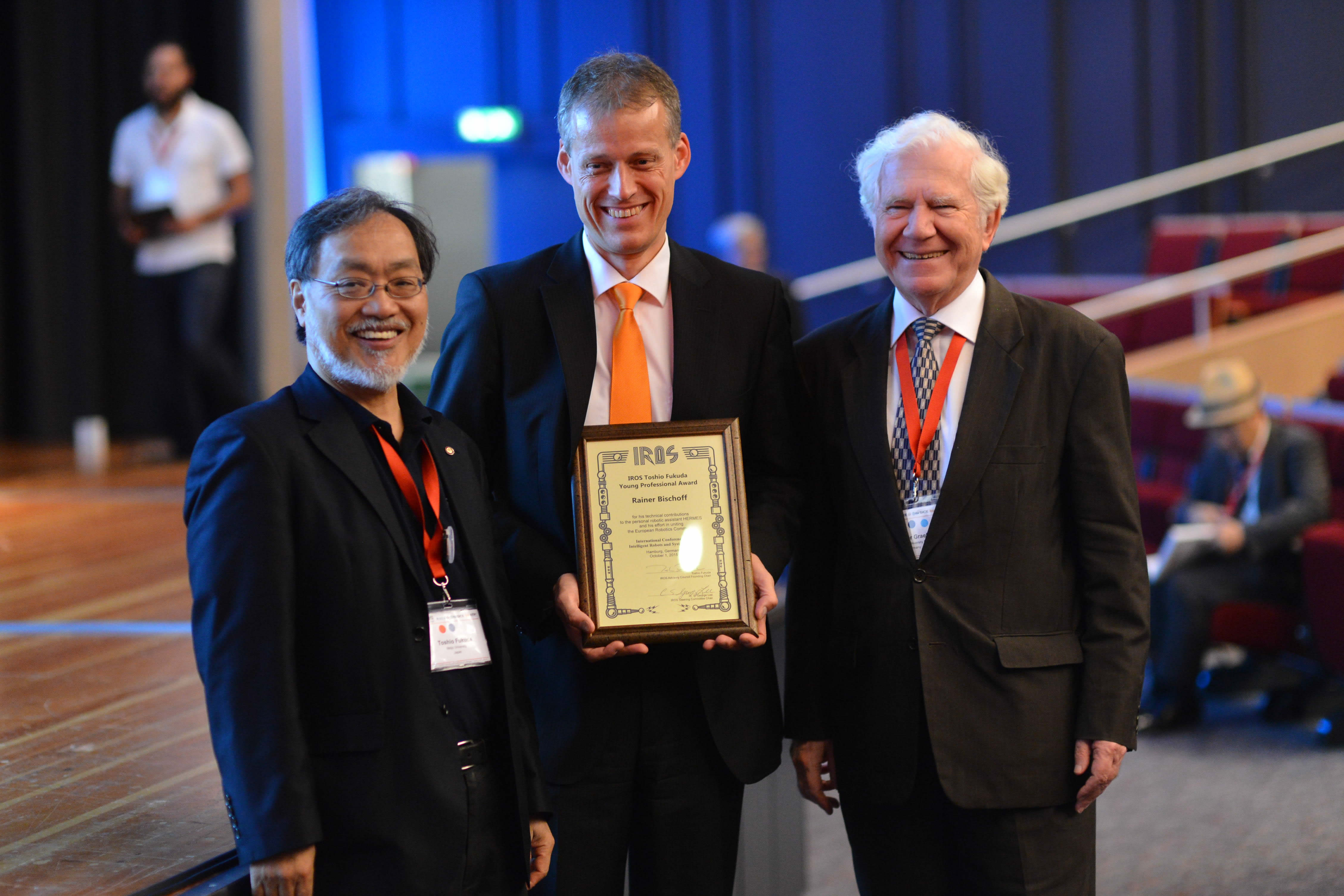 To recognize individuals in the early stage of their career, who have made an identifiable contribution or contributions which have had a major impact on the robotics field.
To recognize individuals in the early stage of their career, who have made an identifiable contribution or contributions which have had a major impact on the robotics field.
Rainer Bischoff - "For his technical contributions to the personal robotic assistant HERMES and his effort in uniting the European robotics community"
IROS 2015 Best Paper Award
To recognize the most outstanding paper presented at the conference, based on quality of contribution, of a written paper, and of the oral presentation.
Xin Alice Wu, Srinivasan Suresh, Hao Jiang, John Ulmen, Elliot Wright Hawkes, David Christensen and Mark Cutkosky
"Tactile Sensing for Gecko-Inspired Adhesion"
IROS 2015 ABB Best Student Paper Award
To recognize the most outstanding paper authored primarily and presented by a student at the conference, based on the quality of the contribution, of the written paper and of the oral presentation.
YuFeng Chen, Elizabeth Farrell Helbling, Gravish Nicholas, Kevin Ma and Robert Wood
"Hybrid Aerial and Aquatic Locomotion in an At-Scale Robotic Insect"
Best ICROS Application Paper Award
Sponsored by the Institute of Control, Robotics, and Systems (ICROS)
Nishanth Koganti, Jimson Gelbolingo Ngeo, Tomoya Tamei, Kazushi Ikeda and Tomohiro Shibata
"Cloth Dynamics Modeling in Latent Spaces and its Application to Robotic Clothing Assistance"
JTCF Novel Technology Paper Award for Amusement Culture
This award recognizes practical technology contributing to toys, toy models, and amusement culture.
Sponsored by the Japan Toy Culture Foundation
Gilad Refael and Amir Degani
"Momentum-Driven Single-Actuated Swimming Robot"
RoboCup Best Paper Award
Sponsored by the RoboCup Federation
Kegui Wu, Wee Sun Lee and David Hsu
"POMDP to the Rescue: Boosting Performance for Robocup Rescue"
posted 29 October 2015
Nominations are due 31 January 2016 for the 2017 IEEE Technical Field Award in Robotics and Automation. This is the most prestigious award presented by the IEEE in the field of robotics and automation and includes a medal and a $US 10,000 honorarium. IEEE TFAs are awarded for contributions or leadership in a specific field of interest of the IEEE and are among the highest awards presented on behalf of the IEEE Board of Directors.
Visit http://www.ieee-ras.org/awards-recognition/ for a description of the award criteria and instructions on submitting a nomination.
The 2016 IEEE Technical Field Award in Robotics and Automation will be presented to Raffaello D'Andrea "For pioneering contributions to design and implementation of distributed, cooperative robotics and automation systems for commercial applications." The presentation will take place at the Award Ceremony held during ICRA 2016 in Stockholm, Sweden from 16-21 May 2016.
posted 29 October 2015




